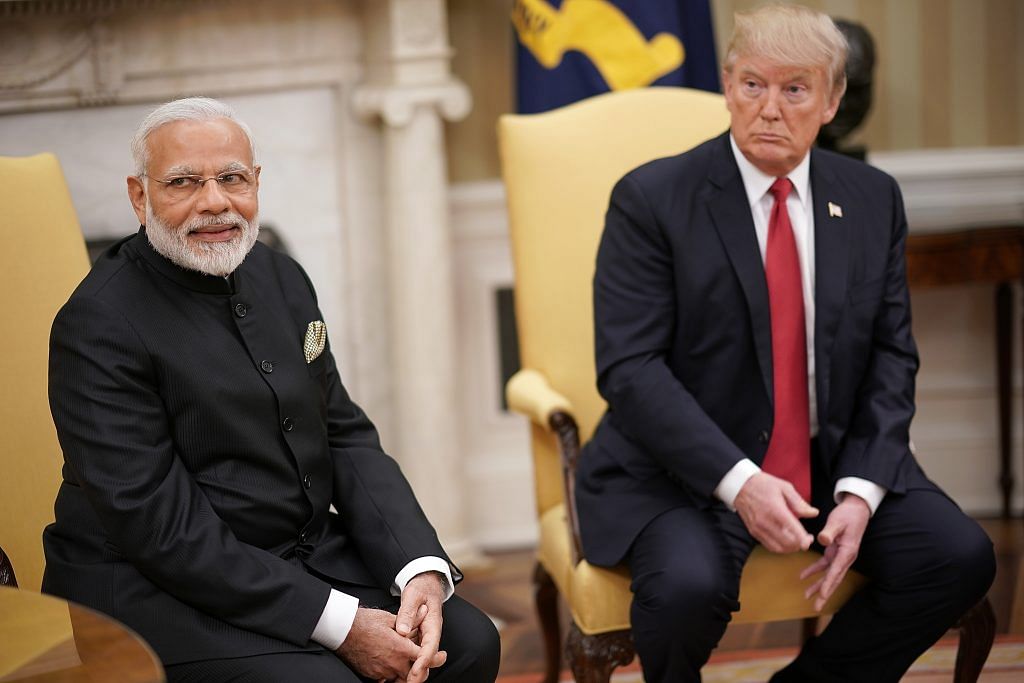Even for tech behemoths from Cisco to IBM, Facebook to Google, there is no sentimental love or preference for Indians.
The year began with the perfect gift for Indians from Donald Trump. There was much joy about his tweet accusing Pakistan of conning the US while supporting terror in Afghanistan.
His attack on Pakistan seemed to confirm several deeply held beliefs by right-wing Hindus: that Trump, unlike his predecessor, sees India as an ally against, and fellow victim of, Islamic terror; that Trump recognises Modi as a fellow strongman and kindred spirit; and that Indians share with Americans the innate qualities of technological brilliance, entrepreneurial ability, and general greatness.
Alas, this rosy — and somewhat deluded — image of India as the favorite son of an American patriarch, with Pakistan as the proverbial prodigal, was cruelly shattered when news emerged of a Trump proposal to deny extensions to H-1B visa holders. The plan, likely brewing before Trump dropped his Pakistan bombshell tweet, clearly targets Indians. As this article notes:
“’The idea is to create a sort of ‘self-deportation’ of hundreds of thousands of Indian tech workers in the United States to open up those jobs for Americans,’ said a U.S. source briefed by Homeland Security officials.”
Ironically, the plan falls under Trump’s “Buy American, Hire American” initiative, which echoes Modi’s “Make in India” programme. The Trump administration clarified that it just wants to cut down on H-1B abuse. Indian commentators began looking for a silver lining by claiming that the forced brain gain of five lakh Indian techies will help our nascent superpower.
These developments reveal certain harsh truths about the conditions of Indians in the US. There are a few strong similarities between the political situations in America and India, which should occasion some soul-searching among privileged Hindus in India, both Modi supporters and otherwise.
Despite the pompous rhetoric about themselves as an intellectually cutting-edge, highly qualified and affluent model minority, the purpose most Indian immigrants (the majority of whom are Hindu) serve in America is largely instrumental. In the conservative American imagination (to which Trump panders even if he may not privately agree with it entirely), America remains a fundamentally Christian country or, grudgingly, a Judeo-Christian one, with Hindus and Muslims as outsiders. No doubt NRI and PIO Hindus are aware of this, and it is this anxiety that compels them to constantly announce their difference from Muslims, South Asian or otherwise, in a classic case of what Freud called “the narcissism of minor difference”.
Even for the tech behemoths, from Cisco to IBM, Facebook to Google, there is no sentimental love or preference for Indians, even if their CEOs may make such flattering noises when they meet Modi. Tomorrow, if Indonesia or Malaysia produced a better version of the Indian tech worker, or if China upped its already formidable game, citizens of these countries would replace the ample numbers of desis in Silicon Valley.
It is curious, though, that Hindus in the US—many of whom have been steadfast supporters of Hindu nationalism since the 1980s, generously funding the Ram Janmabhoomi Mandir movement (which is yet to be built) and launching websites on imaginary Hindu genocides and holocausts at the hands of Muslims—fail to see the parallels between Trump’s America and Modi’s India. In both cases, the nationalism that purports to put America and India first, respectively, is barely more than an ugly majoritarianism that discriminates against minorities.
Trump does not read anything, as Michael Wolff’s just-to-be-released tell-all book reveals, so he is unlikely to have read V.D. Savarkar. Were he to read the pioneering ideologue of Hindutva, he might well find a kindred spirit, at least in terms of his strategy of using policy as a tool of ethnic-religious exclusion.
There is no schadenfreude to be experienced at the possible dislocation of hundreds of thousands of Indians who have made the US their home for years, who pay their taxes, and who enrich American society like other immigrants. But at least among the die-hard Modi supporters, who approvingly see both Modi and Trump as anti-Muslim crusaders, it will provoke some reflection about the costs of ugly nativism and anti-minority prejudices.
At the risk of some simplification, the Indian worker on an H-1B visa in the US is like the Muslim in Modi’s India. She is an outsider, not just by legal status, but by origin and identity. And she is told that she exists only by the good graces and generosity of the majority.
For Trump, the H-1B Indian is no different from the Muslim grandmother who must be kept out of the United States or removed from it by whatever means necessary.
In this perverse equality of discrimination that Trump has practiced, hopefully Modi-supporting NRIs and resident Indians alike can clearly recognise the devastating irrationality of prejudice and the potential it has to severely damage a large number of lives.
Rohit Chopra is an associate professor at Santa Clara University.
